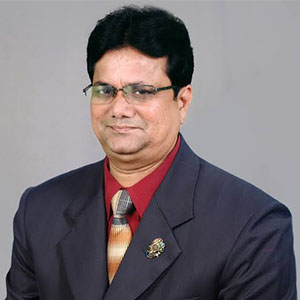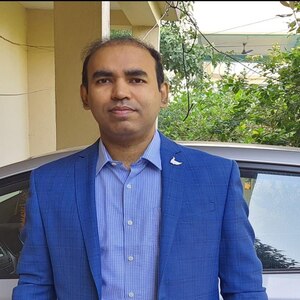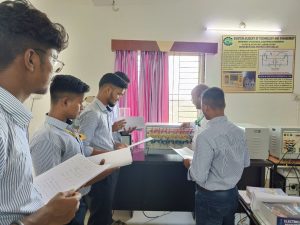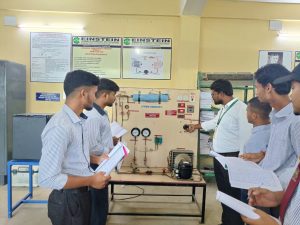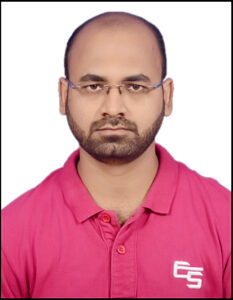Electrical And Electronics Engineering
- Introduction
- HOD’s Message
- Faculty Members
- Vision & Mission
- Courses Offered
- COs
- POs
- PEOs & PSOs
- Laboratory Facilities
- Opportunities
- Achievements
-
Seminar, Workshop,
Conference, FDP, STTP - Value Added Courses
- Student Project/Internship
 Electrical and Electronics Engineering, the branch of engineering concerned with the practical applications of electricity in all its forms, including those of the field of electronics. Electronics engineering is that branch of electrical engineering concerned with the uses of the electromagnetic spectrum and with the application of such electronic devices as integrated circuits and transistors.
Electrical and Electronics Engineering, the branch of engineering concerned with the practical applications of electricity in all its forms, including those of the field of electronics. Electronics engineering is that branch of electrical engineering concerned with the uses of the electromagnetic spectrum and with the application of such electronic devices as integrated circuits and transistors.
In engineering practice, the distinction between electrical engineering and electronics is usually based on the comparative strength of the electric currents used. In this sense, electrical engineering is the branch dealing with “heavy current”—that is, electric light and power systems and apparatuses—whereas electronics engineering deals with such “light current” applications as telephone and radio communication, computers, radar, and automatic control systems. The distinction between the fields has become less sharp with technical progress.
I am privileged to take this opportunity to extend my warm welcome to all the upcoming technocrats of the nation to the Department of Electrical & Electronics Engineering at Einstein Academy of Technology and Management, Baniatangi, Khurdha, Odisha. The department feels proud to share the Technical knowledge so as to educate future technocrats, encourage innovative activities, and take various initiatives which validate the transformation power of Electrical & Electronics Engineering. Our department has recorded steady enhancement in its academic performance & placement activities. In order to keep our students updated to the recent change required for the modern industries, we offer a wide range of Value added courses like MATLAB, PLC, SCADA etc. We believe that all our students who have been placed in various industries have been well accepted into their respective job profiles and have been consistently meeting the expectations of the industries. We feel proud to be a part of a very strong Alumini association, many of whom hold influential positions in the core sectors. We are looking ahead to have much brilliant students, academicians and professionals to connect with us and help in maintaining a competitive learning atmosphere inside the campus.
Dr. Bijaya kumar Mahapatra
- To impart quality and value based education enabling the students to become solution providers for the growing challenges in the industry and society.
- To create awareness among the students, the impact of Electrical and Electronics Engineering in the global scenario and the challenges of electrical based industries and organizations.
- To enhance the competitiveness of the graduates for higher studies by promoting research and development in the field of electrical as well as interdisciplinary subjects.
|
Under Graduate (B. Tech) |
Electrical and Electronics Engineering (60 Intake) |
Programme Outcomes (POs)
PO1: Engineering knowledge: Apply the knowledge of mathematics, science, engineering fundamentals, and an engineering specialization to the solution of complex engineering problems.
PO2: Problem analysis: Identify, formulate, review research literature, and analyze complex engineering problems reaching substantiated conclusions using first principles of mathematics, natural sciences, and engineering sciences
PO3: Design/development of solutions: Design solutions for complex engineering problems and design system components or processes that meet the specified needs with appropriate consideration for the public health and safety, and the cultural, societal, and environmental considerations.
PO4: Conduct investigations of complex problems: Use research-based knowledge and research methods including design of experiments, analysis and interpretation of data, and synthesis of the information to provide valid conclusions.
PO5: Modern tool usage: Create, select, and apply appropriate techniques, resources, and modern engineering and IT tools including prediction and modeling to complex engineering activities with an understanding of the limitations.
PO6: The engineer and society: Apply reasoning informed by the contextual knowledge to assess societal, health, safety, legal and cultural issues and the consequent responsibilities relevant to the professional engineering practice.
PO7: Environment and sustainability: Understand the impact of the professional engineering solutions in societal and environmental contexts, and demonstrate the knowledge of, and need for sustainable development.
PO8: Ethics: Apply ethical principles and commit to professional ethics and responsibilities and norms of the engineering practice.
PO9: Individual and team work: Function effectively as an individual, and as a member or leader in diverse teams, and in multidisciplinary settings.
PO10: Communication: Communicate effectively on complex engineering activities with the engineering community and with society at large, such as, being able to comprehend and write effective reports and design documentation, make effective presentations, and give and receive clear instructions.
PO11: Project management and finance: Demonstrate knowledge and understanding of the engineering and management principles and apply these to one’s own work, as a member and leader in a team, to manage projects and in multidisciplinary environments.
PO12: Life-long learning: Recognize the need for, and have the preparation and ability to engage in independent and life-long learning in the broadest context of technological change.
Program Educational Objectives (PEOs)
PEO-1: Students will acquire a strong foundation in electrical and electronics engineering principles and demonstrate proficiency in applying these principles to solve real-world problems in diverse technical domains.
PEO-2: Students will engage in lifelong learning, keeping pace with advancements in science and technology, and contribute to innovation through research and development activities.
PEO-3: Students will exhibit leadership qualities, entrepreneurial spirit, and the ability to collaborate effectively in interdisciplinary teams, contributing to the growth and success of industries and society.
Program Specific Outcomes (PSOs)
PSO1: Technical Competence: Graduates will demonstrate a deep understanding of electrical and electronics engineering principles, including analysis, design, and implementation of electrical systems and components.
PSO2: Research and Innovation: Graduates will engage in research activities, apply scientific methods, and contribute to the development of new technologies and solutions in the field of electrical and electronics engineering.
PSO3: Problem-solving Skills: Graduates will possess the ability to identify, analyse, and solve complex engineering problems related to electrical and electronics systems, incorporating interdisciplinary approaches where necessary.v
No Information Available……..



